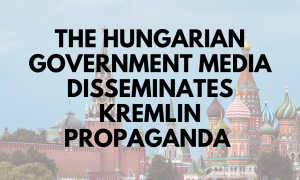
Putin, the man who wasn’t even there
In the following, we will summarise how the popular Krónika news show, which airs at noon every day on the...
The expensively operating public service media in Hungary fail to perform their actual public service functions. What they actually do is to ruin the media market while they sell themselves to the government as a propaganda mouthpiece. Funding for public service media can be curbed and made to comply with EU rules by drawing on the European Union’s existing legal instruments. The European Commission has been reviewing a complaint on the subject filed by MEP Benedek Jávor, along with a market player, Klubrádió, and the media watchdog NGO Mérték Media Monitor, since 2016. The events of the past weeks and the intense protests about bias in the Hungarian public service media will hopefully make it clear to the Commission that it needs to put a halt to the aberration that the Hungarian public service media have become.

In December of 2018, Hungarian public life was riven by noisy protests, one of the main targets of which were the institutions that make up the public service media system in Hungary today. Thousands marched through the cold winter nights from downtown Budapest to the public service media headquarters far removed from the city centre, to express their outrage at the unceasing stream of propaganda spouted by these media outlets. Colloquially, public service media in Hungary have long been referred to as state media; this choice of words, which rejects the official designation, is meant to reflect a return of the editorial practices that had prevailed in state-controlled broadcasts under the old communist regime. The recent protests revealed that the propaganda disseminated by these media, which was often the subject of derision and satirical memes in the social media, has also elicited anger in parts of the public. The tense situation on the ground was further exacerbated when the private security personnel at the public service media used violence against elected Hungarian MPs while thousands of civilians were protesting outside the building.
Domestically, there are practically no effective tools against the biased reporting of the public service media, nor against its other professional and ethical transgressions. However, there is an area where the European Union might intervene to rein in the unprofessional practices that violate basic democratic norms, and that area is funding. Public service media financing is a key issue not only because the existing funding scheme misappropriates tens of billions of forints in taxpayer money in the service of what is essentially free propaganda for the governing party, but also because it would officially buttress the allegations that critics have levelled at the public service media for a long time now, namely that they are excessively and irregularly funded and that their undivided loyalty has been bought by Fidesz. Ultimately, less money for the public service media will mean less propaganda, so scaling back these financial abuses is a vital objective to pursue.
The European Commission attaches strict conditions to public service media funding in order to forestall the market-distorting use of public funds. In our complaint, we highlighted the fact that the funding of the Hungarian “public service” media no longer complies with the European regulations on state aid. The European Commission has been reviewing the complaint since 2016, but now we see the time as ripe to bring the issue out in the open and to discuss it publicly. This may embolden the Commission to seize the moment and move towards the goal with greater determination than it has thus far.
The Hungarian state media, which are theoretically obligated by law to work as public service institutions, operate in the framework of a very complex and confusing institutional structure. Although this might seem surprising, the Media Service Support and Asset Management Fund (abbreviated as MTVA in Hungarian), which is often discussed in public and was also at the centre of the recently organised protests, has legally speaking nothing to do with radio or television broadcasting or the production of online contents – although as often in present-day Hungary, the law and the prevailing reality diverge substantially. The full name of the organisation, which some of those who casually use the acronym may not be aware of, suggests that as a “Fund” it does not produce content but manages money instead. But when it comes to money management, it wields a major responsibility as the MTVA’s funding in the 2019 Hungarian central budget is set at 83.2 billion Hungarian forints (ca. 270 million euros). That may not even seem like a lot by the standards of wealthier and larger countries, but it is worth keeping in mind that the Hungarian state spends about 250 billion forints (ca. 800 million euros) on higher education, in a country where state institutions still massively predominate in the higher education sector. Moreover, every year for a few years now, the government has augmented the base funding with additional funds, and the Media Council has done the same. Moreover, these various appropriations still do not capture the entirety of state funding since they do not include revenue from state advertising.
Practically all of the public media’s content acquisition and show production is performed by the MTVA, and the Fund is also the legal employer of the public service media employees. At the same time, however, the editorial responsibility for the content lies with another organisation, the Duna Médiaszolgáltató Nonprofit Zrt (Duna Media Service Provider Non-Profit Corporation, hereinafter referred to as the Duna Corporation). This total confusion of roles was also on display when the CEO of the Duna Corporation, Menyhért Dobos, went so far as to claim – in a conversation livestreamed by the Hungarian MP Bence Tordai – that he is not public figure. It would be difficult to make any reasonable case that the CEO of a public service media institution is not a public figure. His employers might have failed to alert Mr Dobos to the fact that according to the law, he is in charge of the public media in Hungary, and it is possible that since all the relevant funds are with the MTVA, he himself has simply failed to notice that he is theoretically at the helm of the public media.
The complexity of the system is no sheer coincidence: while the operations of the Duna Corporation are subject to the outside review of several public bodies, especially the Public Service Media Board that is made up of the delegates of organisations specified in the relevant law, the MTVA is subject to the review of a single organisation: the Media Council, which is as renowned for its impartiality as the Sheriff of Nottingham was loved for his sense of fairness. So, to sum up, we have the Duna Corporation, which is designated by the law to serve as a public service media provider and is more or less appropriately subject to external control mechanisms, but in reality the oversight is merely a façade since the Corporation has no resources for the actual performance of these functions. And then there is the MTVA, which disposes of all these taxpayer funds without being subject to any meaningful outside control and no one has a clue of where and how it spends the money.
In the context of the MTVA, the Hungarian legislator openly flouted European public procurement rules. The Hungarian public procurement law provides an exemption from general procurement rules for the acquisition of “audiovisual or radio media services”, even though the Audiovisual Media Services Directive expressly provides that only the contracts of “audiovisual or radio media service providers” may be subject to an exemption. The goal of the Hungarian solution is clearly to exempt the MTVA’s procurements from the relevant requirements even though according to the Media Act it is not a media provider.
The European Commission’s Communication on the application of State aid rules to public service broadcasting lays out in detail which data concerning the financial management of public media must always be accessible and subject to public review. In the Commission’s view, the financial management of public media is transparent when it clearly distinguishes between public service and non-public service activities, including a separate listing of the relevant revenues and expenditures. One precondition that must prevail to comply with this requirement is that each of the shows broadcast must be classified as either public service or non-public service broadcasts, which is in turn contingent on a definition of what public service activity entails.
In Hungary there is no document about the financial operations of public service media that would unequivocally distinguish between public service and non-public service related activities, and which would accordingly separately list the relevant revenues and expenditures. Nor are there any documents that would clearly lay out which shows are assigned to the category of public service and which do not fall into the range of activities thus defined.
According to the Commission’s Communication, “an appropriate authority or appointed body” must continuously monitor public spending “in a transparent and effective manner”. The Hungarian public service institutional structure fails to comply with this requirement.
The Hungarian Media Act provides that the Public Service Board audits the funding and financial management of public service media providers, specifically with a view towards compliance with the relevant EU regulations. Yet the Board lacks the requisite instruments for the performance of an effective and transparent auditing since the Duna Corporation, the target of its reviews, does not actually dispose of the financial resources that are allocated to content production. These resources have been assigned instead to the MTVA’s budget, whose operations and financial management the Board is not authorised to review, however.
The MTVA’s steering body, and thus the official body that performs its public oversight, is the Media Council. From the perspective of the operations of the public service media, however, the latter is not an independent organisation, since it is also the body that decides whether the public media system will be expanded by new channels or new services. Furthermore, the president of the Media Council also appoints the CEO of the MTVA while the Media Council as a body nominates the CEO of the public media service provider.
In addition to defining the scope of state funding, the Media Act also regulates the mode whereby state funding is distributed among the various public service functions. In principle, the latter responsibility is discharged by the Public Service Fiscal Council. The respective CEOs of the MTVA and the Duna Corporation always make up a majority in the Fiscal Council, however, and thus they can jointly decide any issue before the Council. But even in the event that the third delegate, the representative of the State Audit Office, were to propose some new idea, the Council has no more than a right of comment when it comes to the MTVA’s proposed budget. Hence, there is practically no form of external/societal oversight whatsoever when it comes to the allocation of the MTVA’s spending.
The domestic regulations also fail to comply with other European requirements, such as refunding overcompensated funds that were not used in the performance of public service responsibilities, or the requirement of impact assessment prior to launching new public media services.
The public service media’s current mode of operation distorts the market in several ways. One example is that the advertising time of public television channels is sold by the Atmedia sales house, which combines and sells these in a package with the advertising time of commercial media enterprises (including the aggressively pro-government TV2 group, which is owned by a government commissioner who is also a pro-government oligarch). Another distortion in the market is that the MTVA has paid huge fees for the licence to broadcast valuable sports events in which there is no Hungarian involvement whatsoever (e.g., UEFA Champions League, Formula 1). Market players, too, might have an interest in procuring these rights, but the MTVA has snatched these away from the sports channels. Another massively distorting solution is that numerous local radios broadcast news blocks produced by the MTVA based on news provided by the state-owned Hungarian News Agency Corporation (MTI). According to market information, the monthly fee of a news block is 40,000 HUF (ca. 130 euros), which is obviously considerably cheaper than employing even a single news editor. This allows the radios in question to save a lot of money in disseminating – the otherwise mandatory – news blocks, while it also opens up the possibility for even greater governmental control over the news and puts radios that produce their own news at a competitive disadvantage.
Let us emphasise once more that a very strong link exists between the proportionality and transparency of funding and the quality of the public service media market. An unaccountable, inscrutable and unverifiable spending of public funds is not only destructive to the media market overall but completely rules out the possibility of editorial practices that are free of political influence. A public service media that has been bought and paid for can no longer serve as public service media. And if that’s the weak spot of the system, then that’s where it must be tackled. The complaint has been submitted and presented, and now it is the European Commission’s responsibility to decide how long it will put up with the excessive funding of a fake news propaganda machinery.
Bankszámlaszám: 12011265-01425189-00100001
Bank neve: Raiffeisen Bank
Számlatulajdonos: Átlátszónet Alapítvány
1084 Budapest, Déri Miksa utca 10.
IBAN (EUR): HU36120112650142518900400002
IBAN (USD): HU36120112650142518900500009
SWIFT: UBRTHUHB
Számlatulajdonos: Átlátszónet Alapítvány
1084 Budapest, Déri Miksa utca 10.
Bank neve és címe: Raiffeisen Bank
(H-1133 Budapest, Váci út 116-118.)
Támogasd a munkánkat az Átlátszónet Alapítványnak küldött PayPal-adománnyal! Köszönjük.
Támogatom PayPal-adománnyalHa az 1 százalékodat az Átlátszó céljaira, projektjeire kívánod felajánlani, a személyi jövedelemadó bevallásodban az Átlátszónet Alapítvány adószámát tüntesd fel: 18516641-1-42
1% TÁMOGATÁS

In the following, we will summarise how the popular Krónika news show, which airs at noon every day on the...

Az alábbiakban összefoglaljuk, hogy a sokak által hallgatott, a Kossuth Rádióban minden délben jelentkező Krónika c. hírműsor hogy számol be...

As part of our broader analysis of how the election campaign is covered in the television news, it seemed evident...

The attack on Ukraine has led to a widespread outrage in Hungary. However, the deep polarisation that divides Hungarian society...
Támogasd a munkánkat banki átutalással. Az adományokat az Átlátszónet Alapítvány számlájára utalhatod. Az utalás közleményébe írd: „Adomány”, köszönjük!